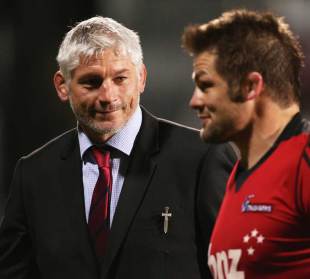|
Super Rugby
Referees 'need to connect' with coaches' game
Andy Withers
February 13, 2015
Greg Growden and Sam Bruce preview the Super Rugby season
Super Rugby match officials have to "connect to the game the coaches [and] players … are expecting to see" if they are to succeed in facilitating the "high-octane and high-intensity rugby" the Key Focus Areas have been designed to produce. SANZAR game manager Lyndon Bray said the manner in which "our game is played in a Super Rugby context is really driven through the coaches", and the referees "need to connect" with the game the players and coaches want to play "otherwise obviously we're going to miss the boat". Miss the boat, Bray told a media teleconference on Wednesday, "and that means we get more coach disappointment, more coach angst towards us, and probably also get more [media] comments from a negative perspective". "And if we don't connect we have to expect that is our issue."
The coaches and players have made it plain that they wish to produce continuity and excitement, but Bray acknowledged "at the same time we want a contest in our game". "And that means there's a real balance act, and the Key Focus Areas are aimed at helping produce that right balance. "You want teams who can keep possession within their own half and feel confident they can play … and not get penalised continuously; at the same time all the teams want to be able to contest for the ball when they're on defence so you've got to create that balance of continuity of play … but when the contest is on, we've got to allow that contest or we lose the fabric of our game. "We need to create the parameters for them to play the game at pace and with the Laws." Bray said the referees had not been issued an edict to crack down on the players to play according to the Key Focus Areas, saying the method of delivery of the message had changed. "We're on a season-long journey," Bray said. "We don't want to get it all right in round one and smack the hell out of the game." 
Coaches such as Todd Blackadder and key players such as Richie McCaw influence the process, Lyndon Bray says
© Getty Images
Enlarge
Bray, meanwhile, was confident that Super Rugby would not be affected by the issues that blighted Test matches as the All Blacks, Wallabies and Springboks toured Europe in November, most notably the video replay issue whereby footage of foul play was shown on the big screens at grounds, perhaps as a result of the host broadcaster's direction, even though the referee hadn't asked for vision of foul play; and also the confusion around the defending of driving mauls from lineouts when the defence stands back off the jumper and the maul is set before a defender has engaged a tackle. Bray said he and his referees were happy with their use of the television match official regarding foul play after "we had some really 'high-Impact' moments that we got wrong" in the first nine weeks of the 2014 competition". These moments revolved largely around TMO decisions "predominantly by the referee himself rather than the TMO" and "secondly just really key moments where we got the balance wrong". The match officials "did a lot of soul searching in week 10", Bray said, "and the results spoke for themselves; we largely lost the controversy, and we avoided the high-impact moments". Bray said the referees "worked hard on how they worked through the TMO-style decisions, including the foul play ones", and they re-visited the issue at camp in Manly recently to "understand what worked for the second half last year and hit the ground running as of round one this year". "We've learned from our experience in that sense." Bray was more concerned by the officials' ability to manage the "non-defence" of a driving maul from lineout, nothing that it was "quite a complex issue". Bray described the non-defence of the drive as "quite a negative tactic because the first thing you're doing is bowing out of the contest which grates against the intent of the game [but] if you do it correctly there's nothing necessarily illegal about what you're doing". Bray said "we've sent some clips to the teams". "They're pretty ugly pictures, so we've basically appealed to our coaches that it's not a great positive technique to use; it does create some pretty ugly pictures for the spectators and for the referee to rule on. The bottom line with the maul is if [a team creates] a maul situation from a lineout and the defenders choose not to engage, and [the team with the ball feeds] the ball to the back and the defenders then come into contact - then the agreement we've got with World Rugby is that we award a scrum to the defenders for an accidental obstruction. "The reason we don't want to give a penalty because it's really a very, very negative tactic which is not really the fault of the attacking team so to speak."
© ESPN Sports Media Ltd Andy Withers is Managing Editor of ESPN in Australia and New Zealand
| |||||||||||||||
Live Sports
Communication error please reload the page.
-
Football
-
Cricket
-
Rugby
-
- Days
- Hrs
- Mins
- Secs
F1 - Abu Dhabi GP
Abu Dhabi Grand Prix December 11-131. Max Verstappen ()
2. Valtteri Bottas (Mercedes)
3. Lewis Hamilton (Mercedes)
4. Alexander Albon ()
5. Lando Norris ()
6. Carlos Sainz Jr ()
-
ESPNOtherLive >>
Golf - Houston Open
Snooker - China Open
Tennis - Miami Open

